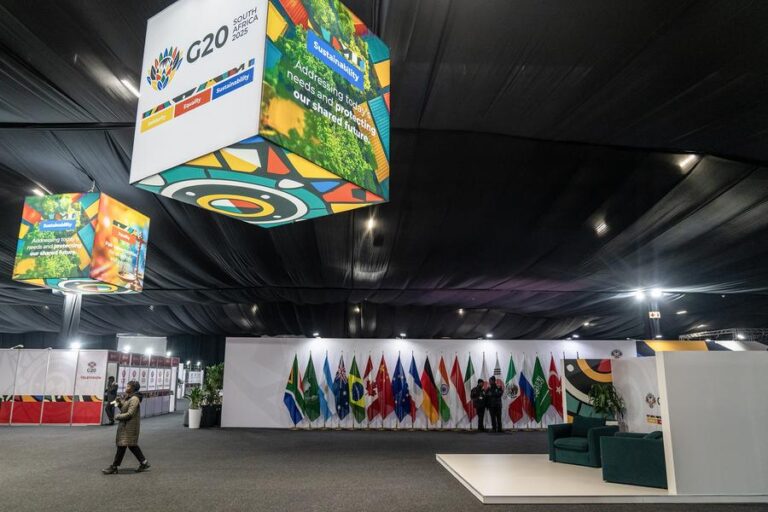Lemmy Nyongesa Mulaku, a lecturer of international studies at the University of Nairobi, said, “The G20 summit provides an opportunity for a stronger partnership between China and Africa to not only push climate adaptation solutions ahead, but to entrench them into global governance institutions and structures.”
JOHANNESBURG, Nov. 21 (Xinhua) — The Group of 20 (G20) Leaders’ Summit will convene over the weekend in Johannesburg, South Africa, the first ever to be held on African soil.
Under the theme “Solidarity, Equality, Sustainability,” the summit highlights the moment for Africa as it seeks to amplify its voice in global governance and advance development priorities shared by the Global South.
Observers say the event reflects Africa’s rising influence and the international community’s expectation that China and other Global South members will help build consensus on multilateralism and inclusive development.
THIS TIME FOR AFRICA
The African Union’s entry into the G20 in 2023 was celebrated across the continent as an “African moment.” Now, with the G20 Summit coming to Africa for the first time, analysts say it signals a historic shift: African countries are moving from passive participants to active contributors in shaping global agendas.
Alvin Botes, deputy minister of international relations and cooperation of South Africa, said, “We are now working hand-in-hand with the African Union to amplify Africa’s voice in global economic governance, whilst ensuring that the development priorities of the African Continent and the Global South find expression firmly onto the agenda of the G20.”
Since assuming the G20 presidency last year, South Africa has sought to orient the summit toward advancing the development agenda of the Global South, especially African countries and identified four priorities, namely strengthening disaster resilience and response, taking action to ensure debt sustainability for low-income countries, mobilizing finance for a just energy transition, and harnessing critical minerals for inclusive growth and sustainable development.
Momar Diongue, director general of Senegalese News Agency, said, “The fact that the G20 is being held for the first time on the African continent is highly symbolic but also strategic: it places our economic priorities at the heart of global discussions.”
He added that thanks to regional integration, “Africa is becoming a driving force in making proposals.”
Peter Kagwanja, chief executive officer of Africa Policy Institute, a think tank in Kenya, said, “the growing participation by Africa in global decision-making processes marks a significant transformation in the international system, where countries in the Global South who were once marginalized and excluded from key discussions such as those focusing on financial reforms, debt sustainability and climate change, are now asserting their voice and influence boldly, and fully participate in solving those challenges.”
SOUTH-SOUTH MOMENTUM
Amid rapid changes unseen in a century, sluggish global economic growth and a widening development deficit, African countries are grappling with climate shocks, mounting debt and other pressures. African experts said the Johannesburg summit will help promote cooperation, support Africa’s development and offer an “African perspective” on tackling global challenges.
South African President Cyril Ramaphosa viewed this year’s summit as an opportunity to place the needs of Africa and the rest of the Global South more firmly on the international development agenda.
“We expect the summit to make a political commitment to address debt vulnerabilities in low and middle-income countries,” he said, adding that he expected the consensus reached at the event to include “a commitment to further strengthen the implementation of the G20 Common Framework for Debt Treatment in a predictable, timely and coordinated manner.”
Lemmy Nyongesa Mulaku, a lecturer of international studies at the University of Nairobi, said, “The G20 summit on the continent provides an opportunity to start genuine reforms aimed at re-balancing these relations through reform of global governance institutions such as the World Bank, IMF and WTO.”
“The G20 summit provides an opportunity for a stronger partnership between China and Africa to not only push climate adaptation solutions ahead, but to entrench them into global governance institutions and structures,” he said.
Observers note that Africa has made significant progress in green transition and the digital economy. As David Mugisha Begumya, a professor with International University of East Africa in Uganda, has put it, Africa holds enormous potential in addressing global climate challenges, making it a growing provider of green solutions.
GLOBAL GOVERNANCE REFORM
At a time when global governance reform stands at a crossroads, making sure that developing countries equally take part in major global governance decision-making is key to just and effective governance.
China has been “the greatest and fundamental supporter” of promoting a more just and equitable international order, said Yarbane Kharrachi, adviser to the minister of higher education and scientific research in Mauritania, pointing to Beijing’s early backing of the African Union’s accession to the G20.
Ahead of the summit, the United States announced its decision not to participate in the event and warned South Africa against pushing for a joint statement.
“Boycott politics never work,” Ramaphosa said in response. “If you boycott an event or a process, you lose because the show will go on.”
African analysts observe that this once again underscores the urgency of global governance reform. South Africa’s firm stance, they say, reflects the determination of Global South countries to push for a fairer global governance system and replace unilateral dominance with multilateral cooperation.
China brings its distinct cultural and intellectual capital to the table, offering alternative perspectives on global governance and development, said David Monyae, director of the Center for Africa-China Studies at the University of Johannesburg.
“This approach embodies the principle that all civilizations are equal, a principle that should guide Africa and other Global South countries in collaboratively shaping development and governance agendas,” he said.■

